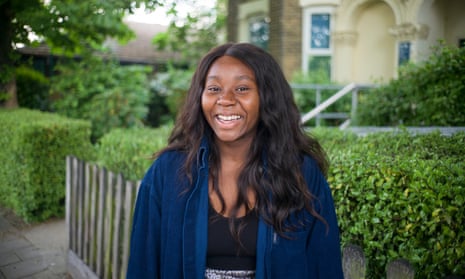Few prospective MEPs will be in the middle of their first year undergraduate exams when hundreds of millions of people across Europe go to the polls later this week. But 19-year-old Londoner Daze Aghaji believes now is the time for her generation to make a stand.
“We are at a turning point,” says Aghaji. “This generation can take leadership and make this change happen or we are facing a genuinely terrible future – so I am trying to do something, to be part of a new politics, part of the new world I want to see.”
Aghaji, who is studying history and politics at Goldsmiths University in south London, is standing as a Climate and Ecological Emergency Independent (CEEI) in Thursday’s European elections. The teenager – who has her sights set on breaking open the political system for the next generation, and maybe a new job as one of Europe’s youngest ever MEPs – is one of nine Extinction Rebellion activists who are standing as independents under the CEEI banner.
Q&AWhat is Extinction Rebellion?
Show

Extinction Rebellion is a protest group that uses non-violent civil disobedience to campaign on environmental issues.
Launched in October 2018, with an assembly at Parliament Square to announce a 'declaration of rebellion' against the UK Government, the group has staged regular demonstrations against current environmental policies.
More than 1,000 activists were arrested in April 2019 after protesters occupied four sites across London, as well as blocking roads, disrupting a railway line and conducting a protest at Heathrow. Other demonstrations have included a semi-naked protest inside the House of Commons and blockading streets in London, Cardiff, Leeds, Bristol and Glasgow.
The group says climate breakdown threatens all life on Earth, and so it is rebelling against politicians who “have failed us”, to provoke radical change that will stave off a climate emergency. The movement has become global with groups set up in countries include the US, Spain, Australia, South Africa and India.
Martin Belam
The teenager is a ball of energy, conviction and warmth as she discusses her campaign over a cup of tea in a south London cafe. “Obviously it would be super cool to win a seat and I would make sure I made it count if that happens,” she says. “But to be honest the likelihood of me winning is pretty small.”
When asked how she is managing to combine studying for exams and campaigning, she shrugs: “It is pretty full on. The course is amazing and this – well, this is a lot of work and stress on top of that.”
After a brief pause, she adds: “But if not now, then when? What am I going to tell future generations – ‘I knew but I had other things to do, I was a bit busy?’”
Born in north London, Aghaji started life in a small one-bedroom flat in Tottenham that she shared with her parents and two siblings. Aged 11, she went away to boarding school after her mum’s Afro-Caribbean restaurant took off.
There, she fell in love with nature – and developed a vague but persistent concern that the natural world was struggling. “We are facing the breakdown of everything that we take for granted,” says Aghaji, who is a veteran of the school climate strikes as well as the Extinction Rebellion protests. “This is a chance to help create something really amazing. How could I let that pass by?
Aghaji believes there is much more at stake in this week’s elections beyond who wins. The evidence of the scale and severity of the climate emergency is growing. Last year, the UN’s leading scientists warned that there were just 12 years to limit climate catastrophe. Earlier this month, another UN report warned that the widespread collapse of ecosystems was putting humanity itself at risk. Just last week it emerged that the Antarctic ice is melting much faster than previously feared.
“I am here as a young black woman because I want to open that space, I want to show other young people from different backgrounds that we can make a stand, that we can seize this moment and make a difference. It is our future that is on the line.”

A recurring critique of Extinction Rebellion and other environment movements has focused on their lack of diversity, both in terms of race and class.
Aghaji, who says that since her mother’s restaurant took off she became part of a “new middle class” acknowledges there is a problem. “There is such an image here of black people not being involved in environmental stuff but if you look more globally then not only are they involved, they have been leading on this stuff for decades … We need to break that stigma of it being so white [in the UK].”
She says the climate crisis is “an issue of class, of race, of age”, with “the poorest being hit the worst”. To get that message across, the CEEI has been holding workshops and events on housing estates across London – where seven out of the nine candidates are standing.
“We are really trying to get out there into communities … starting conversations with people … people you wouldn’t see as ordinary environmentalists, but the reaction has been amazing, people really do care.”
Over the past few months Aghaji says there has been a breakthrough in public understanding of the climate emergency, helped by the success of Extinction Rebellion, the school strike movement and the BBC’s David Attenborough documentary Climate Change – The Facts.
And she says the younger generation – many even younger than her – are a growing source of hope and inspiration. “You can feel the soul, the passion running through the young people that are involved. Looking at the school strikes, I am happy that they are the next generation because they get this and they are on it … you don’t need to tell them how bad it is because they already know.”
However, she acknowledges the challenges are huge. The climate crisis is not, she says, simply an environmental issue, it will have devastating consequences if unchecked, from food shortages to resource wars, the collapse of political and social systems to mass movements of people.
But as she finishes her tea she insists there is still time to act. “I am a hopeless romantic,” says Aghaji with a smile. “This is a huge moment for this generation. If we get this right we can look back in 20 or 30 years and say we did a good job. We still have the chance to create something exciting out of this moment but that window is closing.”
